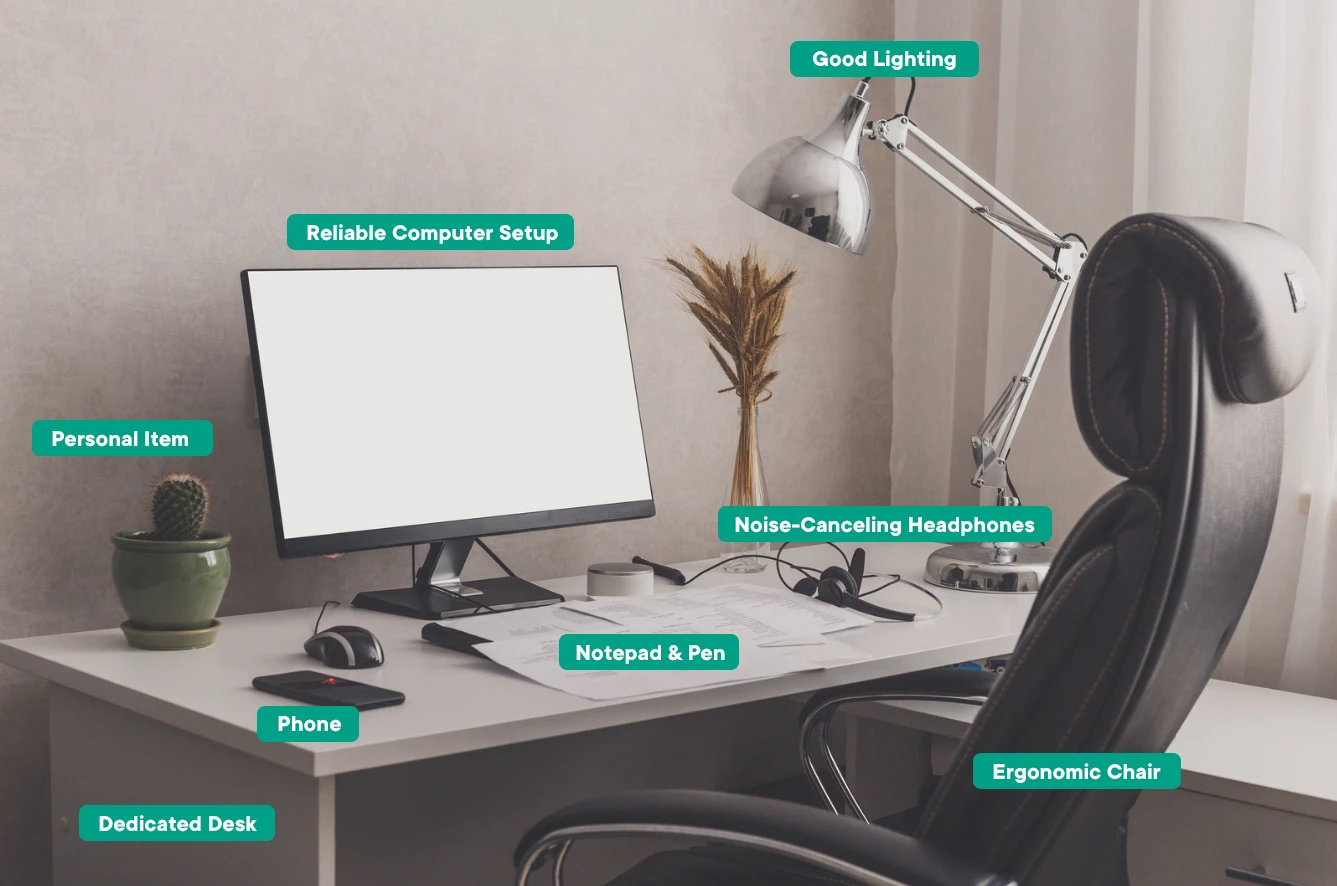In the era of remote work, hiring managers face unique challenges in assessing the suitability of candidates for remote positions. In this article, we combine insights from our expert recruiters to provide you with the ultimate list of interview questions for remote workers, along with an analysis of what each question reveals about the candidate.
The Importance of Interviewing Remote Workers
Interviewing remote workers differs significantly from traditional, on-site hiring. It requires a focus not only on candidates’ knowledge, hard skills, and experience but also on their commitment, communication skills, conflict resolution abilities, motivation, and technological prowess. The ability to work independently, solve problems, resolve conflicts, and gauge productivity are all critical factors in remote work success.
Key Interview Questions for Remote Workers
To help you navigate the remote hiring process, we’ve compiled a list of essential interview questions, each designed to assess a different aspect of a candidate’s suitability for remote work.
1. Can you share your remote work experience?
Previous remote work experience can be a useful indicator of a candidate’s comfort level and reliability in a remote setting. This question helps you understand where they’re starting from and how they’ve adapted to the remote work environment.
- Why this helps: Reveals the candidate’s familiarity with remote work dynamics.
- What to look for: Evidence of successful remote work experience.
- How it helps: Provides insights into the candidate’s ability to work independently and manage their time effectively.
- Red flags: Lack of remote work experience or difficulty adapting to remote work.
2. What tools do you use to manage and complete work remotely?
Remote work requires familiarity with a variety of tools, from collaboration apps and email to time management software and video conferencing technology. This question assesses a candidate’s technical capability and their ability to leverage these tools effectively.
- Why this helps: Assesses the candidate’s technical skills and familiarity with remote work tools.
- What to look for: Proficiency in using common remote work tools and adaptability to new technologies.
- How it helps: Ensures the candidate can effectively collaborate and communicate in a remote setting.
- Red flags: Lack of familiarity with common remote work tools or reluctance to adapt to new technologies.
3. What does your home office setup look like?

A dedicated workspace is crucial for productivity in a remote work environment. This question helps identify whether candidates have a distinct workspace that allows them to focus and be productive.
- Why this helps: Reveals the candidate’s ability to create a productive work environment.
- What to look for: A dedicated workspace that allows for focus and productivity.
- How it helps: Ensures the candidate can maintain productivity in a remote setting.
- Red flags: Lack of a dedicated workspace or a workspace with many potential distractions.
4. How do you manage conflicts or issues when working remotely?
Conflict resolution skills are vital in a remote setting. This question evaluates a candidate’s ability to handle disagreements or issues tactfully and effectively.
- Why this helps: Assesses the candidate’s conflict resolution skills.
- What to look for: Evidence of effective communication and problem-solving skills.
- How it helps: Ensures the candidate can maintain positive relationships in a remote team.
- Red flags: Difficulty handling conflicts or lack of effective communication skills.
5. How do you stay focused and meet deadlines when working remotely?
Time management and the ability to work independently are key traits of successful remote workers. This question assesses a candidate’s discipline and strategies for delivering quality work on time.
- Why this helps: Evaluates the candidate’s time management skills and ability to work independently.
- What to look for: Evidence of discipline, organization, and the ability to meet deadlines.
- How it helps: Ensures the candidate can maintain productivity and meet deadlines in a remote setting.
- Red flags: Difficulty managing time or meeting deadlines.
6. Can you describe a time when you were on a tight deadline and how you managed it?
This question helps identify a candidate’s problem-solving skills and their commitment to meeting deadlines, even under pressure.
- Why this helps: Reveals the candidate’s problem-solving skills and ability to work under pressure.
- What to look for: Evidence of effective problem-solving strategies and the ability to meet deadlines.
- How it helps: Ensures the candidate can handle pressure and deliver work on time.
- Red flags: Difficulty handling pressure or meeting deadlines.
7. What kind of work hours do you keep?
Understanding a candidate’s work schedule and their flexibility to adapt to the business’ needs is crucial in a remote setting. This question helps gauge their adaptability and commitment.
- Why this helps: Assesses the candidate’s flexibility and commitment to the role.
- What to look for: A work schedule that aligns with the company’s needs and the ability to adapt as needed.
- How it helps: Ensures the candidate can meet the company’s scheduling needs.
- Red flags: Inflexibility or a work schedule that doesn’t align with the company’s needs.
8. How do you troubleshoot problems on your own?
Remote workers need to be independent and self-sufficient. This question assesses a candidate’s problem-solving skills and their ability to handle issues independently.
- Why this helps: Evaluates the candidate’s problem-solving skills and independence.
- What to look for: Evidence of effective problem-solving strategies and the ability to troubleshoot independently.
- How it helps: Ensures the candidate can handle challenges and solve problems without constant supervision.
- Red flags: Difficulty solving problems independently or a reliance on others for solutions.
9. Are you comfortable using time-tracking software?
Time-tracking software can be important for managing working hours and tracking productivity in a remote setting. This question evaluates a candidate’s comfort level with using such tools.
- Why this helps: Assesses the candidate’s comfort level with time-tracking software.
- What to look for: Willingness to use time-tracking software and understanding of its importance.
- How it helps: Ensures the candidate can effectively manage their time and productivity.
- Red flags: Unwillingness to use time-tracking software or lack of understanding of its importance.
10. How do you keep up with industry news?
This question assesses a candidate’s commitment and passion for their industry and their willingness to stay updated with the latest news and trends.
- Why this helps: Reveals the candidate’s commitment to their industry and continuous learning.
- What to look for: Evidence of ongoing learning and staying updated with industry trends.
- How it helps: Ensures the candidate is passionate about their industry and committed to staying updated.
- Red flags: Lack of interest in industry news or continuous learning.
11. How do you maintain a healthy work-life balance when working from home?
Working from home can blur the lines between personal and professional life. This question can help you understand how a candidate sets boundaries and ensures they have time to rest and recharge.
- Why this helps: Assesses the candidate’s ability to maintain a healthy work-life balance.
- What to look for: Strategies for setting boundaries and ensuring rest and recharge time.
- How it helps: Ensures the candidate can maintain productivity without burning out.
- Red flags: Lack of boundaries between work and personal life or signs of potential burnout.
12. Can you describe a project or accomplishment that you consider to be the most significant in your career?
This question can give you insights into what the candidate considers important, their role in achieving it, and how it might translate into your organization’s context.
- Why this helps: Reveals the candidate’s values and what they consider significant.
- What to look for: Evidence of significant accomplishments and the candidate’s role in them.
- How it helps: Provides insights into the candidate’s potential contributions to your organization.
- Red flags: Lack of significant accomplishments or inability to articulate their role in them.
13. How do you handle feedback and criticism in a remote setting?
Receiving feedback can be more challenging in a remote setting where nuances can be lost in written communication. This question can help you understand a candidate’s openness to feedback and their ability to use it for growth and improvement.
- Why this helps: Assesses the candidate’s receptiveness to feedback and criticism.
- What to look for: Openness to feedback and strategies for using it for improvement.
- How it helps: Ensures the candidate can handle feedback constructively and use it for growth.
- Red flags: Defensiveness or inability to handle feedback constructively.
14. How do you ensure you’re aligned with your team’s goals and objectives when working remotely?
This question can help you assess a candidate’s strategies for staying connected with their team’s objectives and maintaining alignment with the company’s goals.
Why this helps: Evaluates the candidate’s ability to stay aligned with team goals and objectives.
- What to look for: Strategies for staying connected with team objectives and maintaining alignment with company goals.
- How it helps: Ensures the candidate can contribute effectively to team goals in a remote setting.
- Red flags: Lack of strategies for staying aligned with team goals or difficulty working as part of a team.
15. Can you share an example of a remote project that didn’t go as planned and how you handled it?
Projects don’t always go as planned, and remote work can add an extra layer of complexity. This question can help you understand a candidate’s problem-solving skills and how they handle challenges and setbacks.
- Why this helps: Reveals the candidate’s problem-solving skills and resilience.
- What to look for: Evidence of effective problem-solving strategies and resilience in the face of challenges.
- How it helps: Ensures the candidate can handle setbacks and learn from them.
- Red flags: Difficulty handling setbacks or lack of effective problem-solving strategies.
It’s Important to Remember…
Interviewing remote workers requires a unique approach that takes into account the specific challenges and opportunities of remote work. By asking the right questions, you can assess a candidate’s suitability for remote work and ensure that they have the skills, experience, and mindset needed to succeed in a remote setting.
Remember, the goal of these questions is not just to get answers, but to spark a conversation that will give you deeper insights into the candidate’s abilities and potential as a remote worker. Use these questions as a starting point, and don’t be afraid to delve deeper into any areas that you feel are particularly relevant to the role you’re hiring for.
Additional Considerations
While these questions form the backbone of your interview, remember to also consider other factors that are crucial for remote work. These include:
Cross-Cultural Literacy
In a global remote team, cross-cultural literacy is vital. Ask candidates about their experiences working with diverse teams and how they handle cultural differences.
Cybersecurity Awareness
Remote workers need to be aware of cybersecurity best practices to protect company data. Ask about their understanding of cybersecurity and the measures they take to ensure secure remote work.
Communication Skills
Effective communication is even more critical in a remote setting. Ask candidates about their preferred communication methods and how they ensure clear and effective communication with their team.
Tailoring Your Approach
Remember, the goal is not to ask every question but to select those that are most relevant to the role and your company. Tailor your approach based on the specific needs of your organization and the role you’re hiring for.
Final Thoughts
Hiring remote workers presents unique challenges, but with the right approach, you can find candidates who are not only qualified but also prepared to thrive in a remote work environment. By asking the right questions and understanding what to look for, you can build a remote team that is productive, engaged, and ready to drive your business forward.
In the era of remote work, the ability to effectively interview and assess remote candidates is a skill that every hiring manager needs. With these questions in your toolkit, you’re well-equipped to find the perfect fit for your remote team.
Remember, the key to a successful remote interview is preparation, clear communication, and a thorough understanding of what makes a successful remote worker. With these elements in place, you’re well on your way to building a strong and successful remote team.




